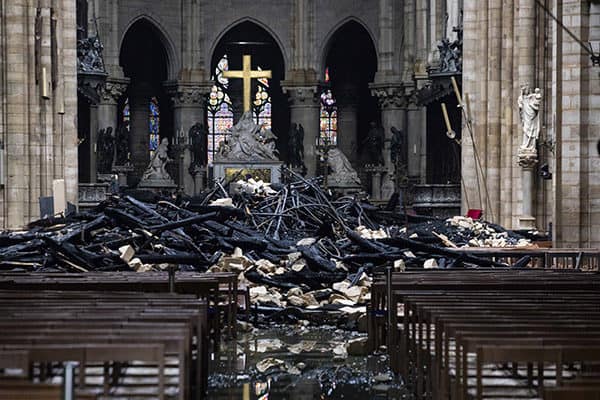Who Hates Notre Dame?
Gregory Hood, American Renaissance, April 20, 2019
The Notre Dame fire horrified most people. Others — who resent whites — were ambivalent or happy.
Hafsa Askar, Muslim and vice president of the French Student Union at Lille University in France, called the cathedral just “bits of wood.” “I don’t give a damn about Notre Dame because I don’t give a damn about the history of France,” she tweeted.
On her verified Twitter account, Sarah Sahim said: “Notre Dame burning is cosmic karma for all the historical sites and artefacts France destroyed and stole when being colonialist scum.” Miss Sahim has written for The Independent, The Guardian, and The A.V. Club.
Rabbi Shlomo Aviner, who used to live in France but now lives in Israel, suggested the fire may be “divine retribution.” Four years ago Benzi Gopstein of the segregationist Lehava movement replied “Of course,” when he was asked if he supported burning churches. (Many other Jews mourned the fire and the American Jewish Committee pledged money towards rebuilding.)
Twitter user “El Buchón Mariwano” wrote: “idgaf about Notre Dame burning down because how many times have white colonizers burned or destroyed our religious structures? How many mosques have they bombed? How many indigenous sacred places have been destroyed? How many burial sites have been desecrated?” This unverified account has few followers, but the tweet got more than 14,800 “likes” and 4,000 retweets. His follow up of “f**k the Catholic church” also got 1,000 likes.

April 16, 2019 – View of the interior of Notre-Dame Cathedral after a fire destroyed the roof. Copyright: xAlexisxSciardx (Credit Image: © Imago via ZUMA Press)
Investigative journalist Andy Ngo compiled a list of about ten Twitter users who celebrated the fire. Many tweets got thousands of likes.
Paul Joseph Watson found people on Facebook with Arabic names posting “smiley faces” on a video of the cathedral burning. When he tweeted about it, BuzzFeed replied that there was “zero evidence Muslims were responding to the video with ‘smiley faces.’” Mr. Watson, who had not mentioned Muslims, countered with a video proving BuzzFeed wrong. He also showed that many Arabic-speaking commenters on the news website France 24 were celebrating.
Rolling Stone’s E.J. Dickson asked what the cathedral meant “to 21st century France.” “[F]or some people in France,” she wrote, “Notre Dame has also served as a deep-seated symbol of resentment, a monument to a deeply flawed institution [the church] and an idealized Christian European France that arguably never existed in the first place.”
Miss Dickson quotes architecture historian Patricio del Real, who says “the building was so overburdened with meaning that its burning feels like an act of liberation.” Architectural historian John Harwood adds that to rebuild the cathedral would be “naïve” because it must be an expression of what “we” [the French] want, and there is no agreement on who is French. “What is an expression of who we are now?” he asks. “What does it represent, who is it for?”
Miss Dickson adds that “what it means to be ‘French,’ however, has obviously changed a great deal over the past few centuries.” (Imagine scare quotes around “black” or “Jewish.”) “Any rebuilding should be a reflection not of an old France, or the France that never was — a non-secular, white European France — but a reflection of the France of today, a France that is currently in the making.”
Daniel Judt of The Nation thinks the destruction of Notre Dame is “an occasion to consider a more expansive idea of what it means to be French.” In his piece, “The Burning of Notre Dame Is Not Just a Tragedy — It’s an Opportunity,” he argues “shared suffering” could “bring a nation together.” “We” could “seize” Notre Dame “as a timely reminder of the kind of nation France was, but also of the kind of nation it could become.” “Anyone can embrace French patrimony and heritage — and the French, in turn, can embrace them,” Mr. Judt explains.
Charles de Gaulle would disagree. The general believed in an “eternal France” with a specific beginning. “For me, the history of France begins with Clovis, elected as king of France by the tribe of the Franks, who gave their name to France,” he wrote. “My country is a Christian country and I reckon the history of France beginning with the accession of a Christian king who bore the name of the Franks.” He said Muslims are “not French,” which would probably be illegal in modern France. He acknowledged there were Frenchmen of all races but insisted they must remain a “small minority” compared to whites. “Otherwise,” he said, “France would no longer be France.” According to Donald Trump in July 2016, France is already “no longer France.”
Notre Dame is quintessentially French. It represents La Grande Nation that existed once and could rise again. That’s why France’s enemies rejoiced at its destruction or want to see it subverted or mutilated.
In the opening of Kenneth Clark’s “Civilization: A Personal View,” he paid tribute to the accomplishments of Western Man while standing in front of Notre Dame. He asked rhetorically what constituted civilization and admitted he couldn’t define it abstractly. Then he turned around and said, “But I think I can recognize it when I see it, and I’m looking at it now.”
These words should remind us of Sam Francis’s warning. “The civilization that we as whites created in Europe and America could not have developed apart from the genetic endowments of the creating people,” he said, “nor is there any reason to believe that the civilization can be successfully transmitted to a different people.” If whites disappear, our accomplishments will, too. Our task is not just to ensure Notre Dame is rebuilt. It’s to rekindle the European spirit that will create the wonders of the future.















